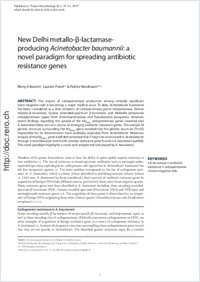New Delhi metallo-β-lactamase-producing Acinetobacter baumannii : a novel paradigm for spreading antibiotic resistance genes
- Bonnin, Rémy A. INSERM U914, Emerging Resistance to Antibiotics, K. Bicêtre, France
- Poirel, Laurent INSERM U914, Emerging Resistance to Antibiotics, K. Bicêtre, France
- Nordmann, Patrice INSERM U914, Emerging Resistance to Antibiotics, K. Bicêtre, France - Medical & Molecular Microbiology Unit, Department of Medicine, Faculty of Science, University of Fribourg, Switzerland
-
2014
Published in:
- Future Microbiology. - 2013, vol. 9, no. 1, p. 33–41
English
The impact of carbapenemase production among clinically significant Gram-negative rods is becoming a major medical issue. To date, Acinetobacter baumannii has been considered as a final recipient of carbapenemase genes (imipenemase, Verona metallo-β-lactamase, Guiana extended-spectrum β-lactamase and Klebsiella pneumonia carbapenemase types) from Enterobacteriaceae and Pseudomonas aeruginosa. However, recent findings regarding the spread of the blaNDM carbapenemase genes revealed that A. baumannii likely acts as a source of emerging antibiotic resistance genes. The analysis of genetic structure surrounding the blaNDM-1 gene revealed that the genetic structure (Tn125) responsible for its dissemination most probably originates from Acinetobacter. Moreover, analysis of the blaNDM-1 gene itself demonstrated that it might be constructed in Acinetobacter through a recombination event with another resistance gene found in A. baumannii (aphA6). This novel paradigm highlights a novel and unexpected role played by A. baumannii.
- Faculty
- Faculté des sciences et de médecine
- Department
- Médecine 3ème année
- Language
-
- English
- Classification
- Medicine
- License
- License undefined
- Identifiers
-
- RERO DOC 209418
- DOI 10.2217/fmb.13.69
- Persistent URL
- https://folia.unifr.ch/unifr/documents/303598
Statistics
Document views: 82
File downloads:
- bon_ndm.pdf: 224
